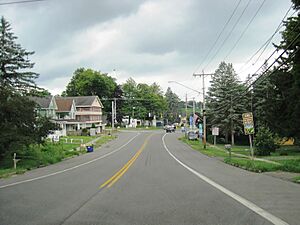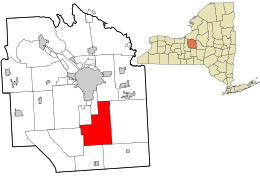LaFayette, New York facts for kids
Quick facts for kids
LaFayette, New York
|
|
|---|---|

US 20 westbound entering the hamlet of LaFayette
|
|

Location in Onondaga County and the state of New York.
|
|
| Country | United States |
| State | New York |
| County | Onondaga |
| Government | |
| • Type | Town Council |
| Area | |
| • Total | 39.65 sq mi (102.68 km2) |
| • Land | 39.25 sq mi (101.65 km2) |
| • Water | 0.40 sq mi (1.03 km2) |
| Elevation | 1,198 ft (365 m) |
| Population
(2020)
|
|
| • Total | 4,910 |
| • Density | 123.83/sq mi (47.82/km2) |
| Time zone | UTC-5 (Eastern (EST)) |
| • Summer (DST) | UTC-4 (EDT) |
| ZIP code |
13084
|
| Area code(s) | 315 |
| FIPS code | 36-40266 |
| GNIS feature ID | 0979125 |
LaFayette is a town in Onondaga County, New York. In 2020, about 4,910 people lived there. The town is named after the Marquis de Lafayette. He was a very important person in both the French and American wars for freedom. Many see him as a hero in both France and the United States. LaFayette is located in the southern part of Onondaga County, just south of Syracuse.
Contents
History of LaFayette
The area where LaFayette is located was once part of a special land area called the Central New York Military Tract. Some of this land was set aside for members of the Onondaga tribe. The very first settler arrived in the area around 1797.
In 1817, the land was bought from the Onondaga people and then sold to new settlers. The town of LaFayette was officially created on April 15, 1825. It was formed from parts of the towns of Pompey and Onondaga. This happened after the Marquis de Lafayette made a famous trip around the United States in 1824 and 1825.
Every year, LaFayette hosts an Apple Festival. This festival takes place on the Saturday and Sunday before Columbus Day. It's a big event because many apple orchards have historically been located west of the town. Today, there are still four apple orchards in LaFayette.
Geography and Roads
LaFayette covers a total area of about 39.6 square miles (102.6 square kilometers). Most of this area, about 39.2 square miles (101.6 square kilometers), is land. The rest, about 0.3 square miles (1.03 square kilometers), is water.
Important highways run through LaFayette. These include Interstate 81 and U.S. Route 11, which both go north and south. They cross U.S. Route 20, which runs east and west, near the main LaFayette hamlet. Another north-south road, New York State Route 11A, runs alongside US-11 in the town.
Population Information
The population of LaFayette has changed over the years. Here's how many people have lived in the town during different census years:
| Historical population | |||
|---|---|---|---|
| Census | Pop. | %± | |
| 1830 | 2,560 | — | |
| 1840 | 2,600 | 1.6% | |
| 1850 | 2,533 | −2.6% | |
| 1860 | 2,537 | 0.2% | |
| 1870 | 2,233 | −12.0% | |
| 1880 | 2,160 | −3.3% | |
| 1890 | 1,874 | −13.2% | |
| 1900 | 1,678 | −10.5% | |
| 1910 | 1,413 | −15.8% | |
| 1920 | 1,293 | −8.5% | |
| 1930 | 1,438 | 11.2% | |
| 1940 | 1,550 | 7.8% | |
| 1950 | 2,083 | 34.4% | |
| 1960 | 3,379 | 62.2% | |
| 1970 | 4,401 | 30.2% | |
| 1980 | 4,488 | 2.0% | |
| 1990 | 5,105 | 13.7% | |
| 2000 | 4,833 | −5.3% | |
| 2010 | 4,952 | 2.5% | |
| 2020 | 4,910 | −0.8% | |
| U.S. Decennial Census | |||
In 2000, there were 4,833 people living in LaFayette. Most of the people were White (about 95%). There were also small percentages of African American, Native American, and Asian residents. About 0.43% of the population was Hispanic or Latino.
The average household in LaFayette had about 2.64 people, and the average family had about 3.09 people. About 35.7% of households had children under 18 living with them. The median age in the town was 40 years old.
Places to Visit and See
LaFayette has several useful places and services. You can find a post office, a gas station, and optometrists. There's also a McDonald's restaurant and a Byrne Dairy store. The town is home to the LaFayette Junior/Senior High School and Grimshaw Elementary School.
Communities and Other Locations
The Town of LaFayette includes several smaller communities and interesting spots:
- Baileys Settlement – A small community located west of the main LaFayette hamlet.
- Big Bend – A hamlet found southeast of the LaFayette hamlet, along US-20.
- Cardiff – Another hamlet situated west of the LaFayette hamlet on US-20.
- Collingwood – A hamlet located southwest of the Big Bend area.
- LaFayette – This is the largest hamlet in the town. It's where US-11 and US-20 cross. People sometimes call it "the village," but it's not officially an incorporated village.
- Jamesville Beach Park – A county park located near the Jamesville Reservoir, south of Jamesville.
- Jamesville Reservoir – A lake found next to Jamesville Beach Park.
- Onativia – A hamlet located east of the LaFayette hamlet.
- Tully Valley – A specific area on NY-11A in the southwestern part of LaFayette.
- Webb Hollow – This location is on Webb Road, near where it crosses Shute Road, northwest of the LaFayette hamlet. It's named for a hollow area in the creek that runs along Webb Road, which is also known as Webb Hollow Road.
Famous People from LaFayette
- Gerrit T. Thorn – He was a legislator and lawyer in Wisconsin and was born in LaFayette.
See also
 In Spanish: LaFayette (Nueva York) para niños
In Spanish: LaFayette (Nueva York) para niños

